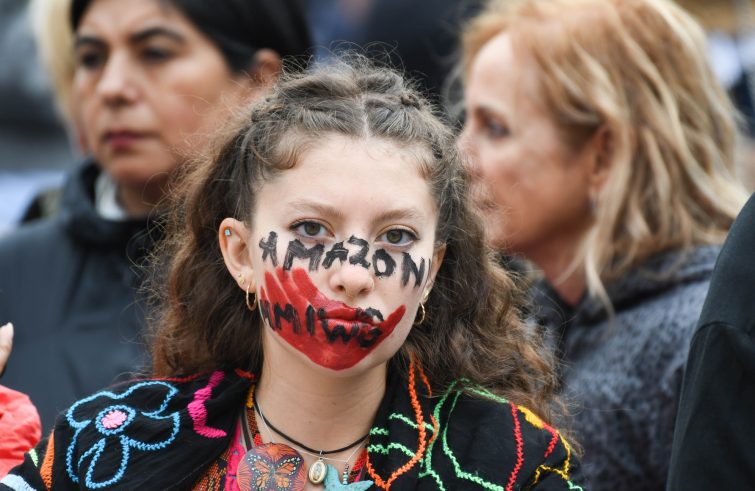
Only the priest can say: “This is my body.” This “qualifies the priest alone to preside at the Eucharist”. In the fourth and concluding chapter of the Post-Synodal Apostolic Exhortation “Querida Amazonia”, dedicated to the pastoral aspect, the Pope definitively dispels all doubts regarding the priestly ordination of married deacons to compensate for the shortage of clergy, raised during the Synod on the Amazon last October. “The principle and non-delegable function” of the priest lies in the sacrament of Holy Orders, which “configures him to Christ the priest.” “the exclusive character received in Holy Orders qualifies the priest alone to preside at the Eucharist. That is his particular, principal and non-delegable function.” The Pope underlines that there are other words too, that “he alone can speak: ‘I absolve you from your sins”. Because sacramental forgiveness is at the service of a worthy celebration of the Eucharist. These two sacraments lie at the heart of the priest’s exclusive identity.” “In a synodal Church, those women who in fact have a central part to play in Amazonian communities should have access to positions, including ecclesial services, that do not entail Holy Orders and that can better signify the role that is theirs.” This is the Pope’s second proposal, emphasizing that “these services entail stability, public recognition and a commission from the bishop.” “This would also allow women to have a real and effective impact on the organization, the most important decisions and the direction of communities, while continuing to do so in a way that reflects their womanhood”, Francis writes. The Exhortation revolves around four “great dreams”: social, cultural, ecological and ecclesial, corresponding to four “interpretative keys” proposed by the Holy Father in his speech delivered past October upon the closing of the Synod for the Pan-Amazon region.
Sacraments “should be accessible,
especially for the poor, and must never be refused for financial reasons”, the Pope remarks calling for “a more frequent celebration of the Eucharist, even in the remotest and most isolated communities.” “The laity can proclaim God’s word, teach, organize communities, celebrate certain sacraments, seek different ways to express popular devotion and develop the multitude of gifts that the Spirit pours out in their midst”, the Pope goes on: “But they need the celebration of the Eucharist because it makes the Church”.
Hence the Pope urges “all bishops, especially those in Latin America, not only to promote prayer for priestly vocations, but also to be more generous in encouraging those who display a missionary vocation to opt for the Amazon region.”
Permanent deacons, religious women and lay persons should “assume important responsibilities for the growth of communities”: “A Church of Amazonian features – Francis writes – requires the stable presence of mature and lay leaders endowed with authority and familiar with the languages, cultures, spiritual experience and communal way of life in the different places.”
“It is possible that, due to a lack of priests, a bishop can entrust participation in the exercise of the pastoral care of a parish to a deacon, to another person who is not a priest, or to a community of persons”, the Pope specifies in a footnote quoting from the Code of Canon Law.
“Permit the growth of a specific ecclesial culture that is distinctively lay” – is the Pope’s “dream” for the Amazon region – “through the vigorous, broad and active involvement of the laity.” “Base communities” are the role models, since “when able to combine the defence of social rights with missionary proclamation and spirituality, they have been authentic experiences of synodality in the Church’s journey of evangelization in the Amazon region.”
With regard to women’s role, Francis guards against “reductionism” that “would lead us to believe that women would be granted a greater status and participation in the Church only if they were admitted to Holy Orders.” “without women”, the Church “breaks down”, is the Pope’s commendation, “and how many communities in the Amazon would have collapsed, had women not been there to sustain them, keep them together and care for them.”
In the opening part of the Exhortation Francis points at the “injustice and crime” to describe the exploitation of the Pan-Amazon region:
We cannot allow globalization to become a new version of colonialism”,
is the Pope’s appeal. “We need to feel outrage” for a “shameful past.” Not least, the Pope expresses a plea of “forgiveness” for the missionaries that in the Amazon “did not always take the side of the oppressed.” “The equilibrium of our planet also depends on the health of the Amazon region”, are the opening lines of the Exhortation devoted to environmental themes. “The cry of the Amazon region reaches everyone because the conquest and exploitation of resources has today reached the point of threatening the environment’s hospitable aspect: the environment as ‘resource’ risks threatening the environment as ‘home’”.











